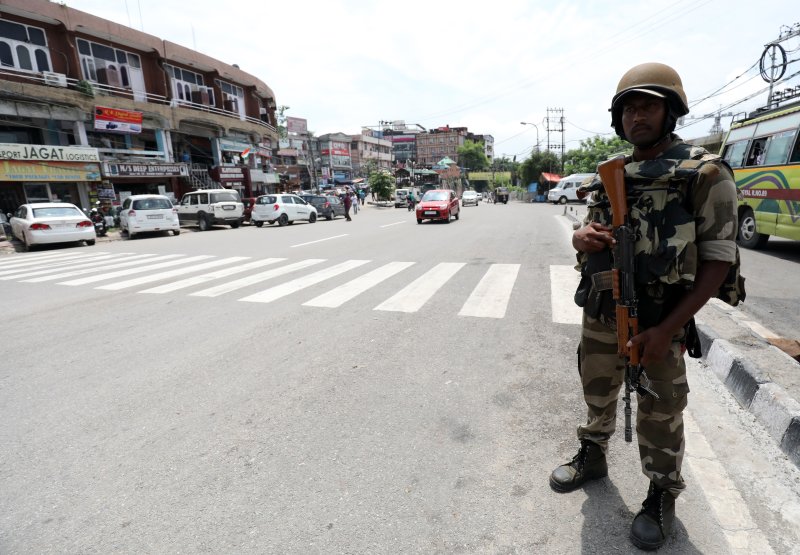The Indian Kashmir region has been under heavy lockdown since Aug. 5 when its special autonomous status was revoked and security is on the high alert ahead of Independence Day celebrations across the country. Photo by Jaipal Singh/EPA-EFE
Aug. 15 (UPI) -- Pakistan's Prime Minister Imran Khan chastised world leaders Thursday for their silence over India's revoking of Kashmir's autonomous status and warned of "repercussions" from the Muslim world if its neighbor commits genocide in the disputed region.
"Will world silently witness another Srebrenica-type massacre and ethnic cleansing of Muslims in [India Occupied Kashmir]?" he asked via Twitter, referring to the deaths of thousands in the town of Srebrenica during the Bosnian War of 1995. "I want to warn international community if it allows this to happen, it will have severe repercussions and reactions in the Muslim world setting off radicalization and cycles of violence."
The message comes on the 12th day of a New Delhi-imposed curfew and communications blackout in India Occupied Kashmir, a Muslim-majority region under a Hindu-dominate government.
On Aug. 5, India's parliament announced it revoked Article 370, which granted the IOK its special-autonomous status while downgrading it to a territory, giving India more control over the area.
Both countries claim Kashmir and have fought several wars over the region, resulting in the area being divided by the Line of Control into India's territory of the region to the south and Pakistan's to the north.
On Thursday, India's Independence Day, Indian Prime Minister Narendra Modi said the revoking of Kashmir's status fulfils the country's dream of a unified India.
"One nation, one constitution -- this spirit has become a reality and India is proud of it," he said during his speech commemorating the day.
Earlier, he defended the decision by saying it would bring stability to the region while riding it of "terrorism."
"I am confident that the people of Jammu and Kashmir will defeat separatism and move forward with new hopes," he said.
However, not all in India agree with the decision, as the opposition Indian National Congress Party condemned it and Modi's Bharatiya Janata Party as having acted undemocratically, despite the motion to end the special status having paseed by a vote of 370 to 70.
"The unilateral and undemocratic manner in which Article 370 was abrogated and J&K was dismembered is deplorable," the party said on Twitter Thursday following Modi's speech while referring to Jammu and Kashmir by its initials. "One shudders at the thought of what this 'democratic' government will do next."
Meanwhile, United Nations Secretary-General Antoni Guterres called on both Pakistan and India to exercise "maximum restraint" and to seek a diplomatic solution.
"The secretary-general also recalls the 1972 Agreement on bilateral relations between India and Pakistan, also known as the Simla Agreement, which states that the final status of Jammu and Kashmir is to be settled by peaceful means," the statement said.
On Wednesday, Khan said he doesn't want war but Pakistan would "fight to the end" over Kashmir.
Khan made the comments from Pakistan Occupied Kashmir on the day of Pakistan's independence, saying India is not interested in discussing the issue.
"We will fight to the end if it comes to that. To the very end," he said. "And at the end of that path, Kashmir will be independent."
Pakistan has previously said that it worries the imposed curfew, communications blackout and increased Indian military presence in IOK are signs of an "impending genocide of Kashmiris."















